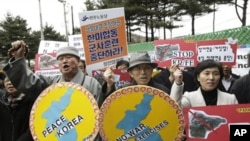South Korea and the United States on Monday began their annual extensive joint military exercises, prompting a renewed war threat by North Korea.
More than 12,000 members of the U.S. military are joining 200,000 South Korean service members for the maneuvers.
South Korean media report that exercise scenarios this year include tracing weapons of mass destruction and coping with a sudden regime change in Pyongyang.
Retired U.S. Army General John Wickham, who commanded American forces here, says it is not surprising that such a contingency has become part of the long-standing joint exercise.
"That's an important thing to be concerned about, given the uncertainty of food problems and the transition of leadership. It would be foolhardy if the South Korean authorities and the Combined Forces authorities weren't planning for the potential of something like that. I'm sure the Chinese are concerned about that, too," said Wickham.
The United States says the drills are defensive in nature and that it informed North Korea in advance about the exercises.
There are two parts to the drill. A command post computer simulation war game called Key Resolve is scheduled to continue until March 10. Air, ground and naval forces are taking part in maneuvers code-named "Foal Eagle". They are expected to run through the end of
April.
South Korean media report that the U.S. aircraft carrier Ronald Reagan will participate. U.S. military sources say an announcement is expected to be made by the end of this week on which navy ships will take part in "Foal Eagle".
North Korea’s army on Sunday said the U.S.-South Korea drills are aimed at removing the country’s nuclear weapons arsenal and destroying the country. It warned that provoking Pyongyang through the exercises would lead to "all-out war" with the South Korean capital being turned into "a sea of fire."
General Wickham says he has heard similar rhetoric before and that he is not overly concerned. "I think this is more saber rattling to see how far they can push the envelope of tension and fear," he said.
South Korea’s Defense Ministry denies a Yonhap news agency report quoting the Joints Chiefs of Staff here as saying the country’s military alert status for maritime and land borders has been raised to cope with any provocations from the North.
Tensions on the Korean Peninsula soared to their highest level in decades last year. North Korea was blamed for sinking a South Korean naval warship in the Yellow Sea. Forty-six South Korean sailors died in the incident. In the same waters, North Korea shelled Frontier island where the South was conducting a military drill. Four people died on Yeongpyeong Island during that incident.
North Korea on Sunday also threatened to fire again into the South if a propaganda balloon campaign is not halted.
Two-and-a-half million leaflets were floated into the North earlier this month. The balloons carried messages ridiculing North Korean leader Kim Jong Il and calling for people to rise against the communist government. The balloons also carried news of the Middle East uprisings.
Governing Grand National Party lawmaker Shin Ji-ho, who took part in a recent balloon launch near the Demilitarized Zone says that regardless of what North Korea says, South Korea will continue to send balloons over the border.
